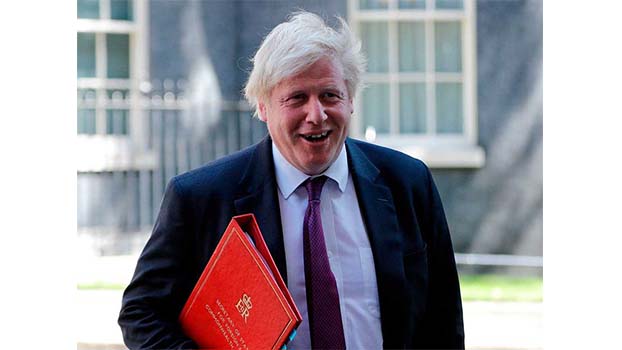Boris Johnson’s message appealed to voters. He will lead Britain out of Europe in weeks
For Tories a stunning win of historic proportions in the UK


So Boris Johnson has his mandate to Get Brexit Done — and he will indeed do it and take Britain out of the European Union on January 31.
But then what? The Conservative manifesto is light on details when it comes to those promises for more hospital funding, more police, more public services.
Thursday’s election was all about Brexit. The Conservative leader campaigned on ending three years of political divide over how and when to leave the EU. It was a message that clearly appealed to nearly half of all voters in England and Wales and looked likely to secure a majority of more than 80 seats as counting continued overnight.
If this election was all about Brexit then how did Labour get it so wrong. Labour leader Jeremy Corbyn tried to change the agenda to health care, social housing, transport, education, policing — but on the key issue of Brexit the party’s policy was confused.
If he became Prime Minister, he pledged to organised a third withdrawal agreement with Brussels, one that would keep the UK in the customs union and closely aligned with Brussels. That new deal would then be offered in another referendum, with Leave also on the ballot paper.
Another withdrawal agreement? More talks? Another referendum? No, after years of this Brexit mess, Britons had enough — and Boris had the answer: Get Brexit done.
The result of this confused thinking is that Corbyn has led Labour to its worst showing since 1935 — back in the days when right-wing populism and was rampant in Europe. In the early hours of Friday morning, seats that has been Labour red for more than nine decades fell to Johnson’s simple mantra.
Landslide victory
In historical terms, Johnson has become only the second Conservative leader to lead it to a fourth consecutive election victory — and he’s only been at the helm of the party since July.
The scale of his victory has only been eclipsed by Margaret Thatcher, who won 144 seats in her landslide victory in 1987. Johnson, however, has eclipsed John Major, David Cameron and Theresa May by the scale of his victory.
Thatcher led a government and party then that wrestled with the nature of Britain’s relationship with Europe. It was an issue that led to her departure, and played no small part in ending the tenure of her successor, John Major.
David Cameron recognised the depth of Euroscepticism too, but tacked by calling a referendum on the issue — and after Thursday’s vote we know how that and the events since, turn out.
Europe too doomed Theresa May as a footnote of parliamentary history. Certainly, in the first months of his tenure, Johnson looked like being nothing more than a footnote too — he lost virtually every vote he faced as prime Minister, couldn’t control the Commons legislative agenda, and was forced by combined opposition votes to seek a humiliating extension to Brexit past that October 31 deadline — over his dead body.
No, it is Labour who are bringing out their dead now, a party that couldn’t get its message heard, was off key — and with a leader who, as many feared in recent months, a liability.
Since the election was called, every one of 70 opinion polls put Johnson ahead — something that May did not achieve in 2017, nor Cameron in 2015 or in 2010. Only Tony Blair and his New Labour can claim that too.
Look no further
If there is a caution in all of this, Johnson need look no further than north of the border. In Scotland, the Scottish Nationalist Party looks likely to claim all but two or three seats there. That’s an impressive level of support for Nicola Sturgeon and her clear message: Scotland needs a second referendum on its place in the United Kingdom.
Johnson has consistently said that 2014 independence referendum was a once on a generation vote. For the Scots, a majority of whom voter to Remain, having a Conservative government in London who seems unwilling and unable to listen to their concerns, the case for independence will only seem stronger.
In Northern Ireland, a region that voted to Remain too, the scale of the Conservative win means that the Democratic Unionist party has lost any influence in 10 Downing Street. Johnson’s withdraw agreement that will now take effect at the end of January, puts a customs border down the Irish Sea.
The veneer of unity that has existed between Northern Ireland and the rest of the UK is now gone. It is different. Belfast is not the same as Bristol. Getting Brexit Done by the end of January now sets the province on a new course — one that might very well lead to a border poll on the future of the province and its place in the union.
Mick O’Reilly is the Gulf News Foreign Correspondent based in Europe


